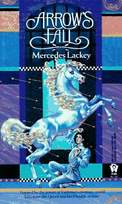
| Series: | Heralds of Valdemar #3 |
| Publisher: | DAW |
| Copyright: | January 1988 |
| ISBN: | 0-88677-400-4 |
| Format: | Mass market |
| Pages: | 319 |
This is the third book in the Heralds of Valdemar trilogy (the initial trilogy of the long-running Valdemar series). You should not start here; if you're going to read the first trilogy, start with Arrows of the Queen. (You may want to consider stopping there too, for this trilogy, and skipping ahead to later works in the same universe.)
This is the first book in this trilogy where my memory steered me wrong. The first book I remembered being uneven but with great moments, and the second book weak unless one was interested in psychic power design and world-building. Those were both about right in re-reading. Arrow's Fall I remembered being one of those books where tha author puts the characters through hell in order to build up a very emotional climax. That's in here, somewhat, but my memory completely edited out the mind-numbingly, tooth-gratingly horrible love story.
As mentioned in my review of Arrow's Flight, one of the things I most dislike in a book is when the plot is based on otherwise perfectly sensible people refusing to talk to each other. Arrow's Flight had a few halfway-justified reasons for this, but was already bad. Arrow's Fall starts with a completely absurd farce of a love story that becomes something cruel. Two characters are obviously in love, everyone around them knows that they're in love and comments on this all the time, there's some magical pair-bonding Herald thing involved (ugh), and they're both convinced that the other person is uninterested or is in love with someone else. And this drags on and on and on and on, it's completely obvious (or should be) to their supposed friends, and those friends never take them both and dump them in a horse trough for being idiots. One of them even systematically makes it worse.
I am not, to be clear, saying that this is necessarily unrealistic, although Lackey plays with it to the point of ridiculous exaggeration, presumably because it's supposed to be somewhat comic. (I have never found things like this particularly comic, and this in particular was just painful.) But there are many things that are realistic that I don't want to read about in books, particularly books whose whole redeeming value is in being warm-hearted fantasy based on a strong dose of wish fulfillment.
This is, as is probably obvious, a strong personal preference. I don't claim that it's universal. If you like that sort of tragicomic love affair, or at least derive emotional satisfaction from seeing it resolve, you may like this. It bothered me less when I first read it as a teenager than it does now. But if you're like me, be warned.
The rest of the book shares some of the same structure as Arrow's Flight: there's an opening bit of stories of Talia around the Collegium that seems a bit random (although less so than the previous books), and then Talia goes off on a mission that forms the core of the story. This is quite a bit darker than either of the previous two books: shockingly dark, in fact. I remember finding the emotional cycle wrenching and affecting the first time I read it, as a much less experienced reader. Now, perhaps I've gotten jaded from reading too many plot constructions like this, or perhaps the story was defanged from knowing exactly what would happen, but it didn't really work for me. The villains are too completely evil, the violence and despair is so sudden and shocking that it feels a bit gratuitous, and there's such a Manichean dichotomy in the story construction that I had a hard time taking it seriously. Villains gloating at heroes kept captive in their dungeons is a bit cliched.
That said, there are definitely some moments. The resolution of the love story was one for me originally, but isn't any more; this time around, I found it a bit too cloying (partly because I was still highly irritated at the characters for being idiots). But Talia's quiet competence and the way that the Heralds rally around their own (and the ability Lackey has for portraying those sorts of emotions) still comes through and still made me smile at times. I hated the whole plot setup, but the plot resolution is not without its merits.
But, overall, I have to recommend against this book as well. Neither of the second two books of the trilogy reproduce the magic of Arrows of the Queen, and in the broader context of the Valdemar series, they're both rather forgettable. Lackey gets much better at balancing story and world background and better at plotting without losing her emotional touch. It's sadly a bit too obvious that these books were her first novel-length work. I have fond memories from reading them as a teenager, but now I'd have to recommend others give them a pass. There's much better stuff later on in the series.
Reviewed: 2011-03-30